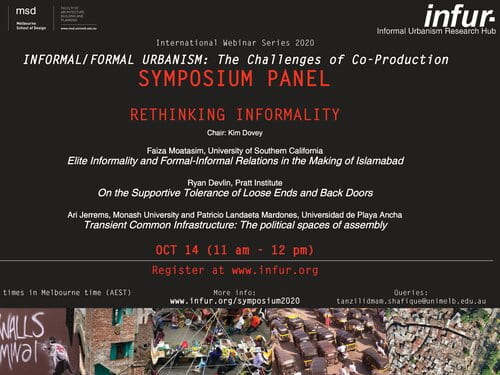
Oct 14, 2020 / InfUr Webinar 2 / Symposium Panel on “Rethinking Informality”
RETHINKING INFORMALITY
Watch here:
Presentation abstracts:
Elite Informality and Formal-Informal Relations in the Making of Islamabad Faiza Moatasim, University of Southern California
To demonstrate the entwined relationship between the formal and the informal, this paper will present the history of Bani Gala, an elite village that has emerged within a protected nature reserve in Islamabad. In Bani Gala a handful of elite homebuilders began building their lavish mansions in the 1980s, and eventually initiated a process of revision of the city’s official zoning regulations. By mobilizing their networks of monetary resources and political connections, developing unlikely alliances and mimicking bureaucratic procedures, these wealthy homebuilders were able to transform the undeveloped village of Bani Gala into an elite informal neighborhood. The paper highlights how the influential residents of Bani Gala resisted anti-encroachment campaigns and legitimized their illegal building activities through legal proceedings. The revision of the master plan and zoning regulations of Islamabad as a result of favorable court decisions thus challenges the notion of informal urban developments as hybrid and extra-legal phenomena or official exemptions. Spaces that are initially developed in breach of the official master plan eventually institute major structural changes in the official master plan and planning regulations – a form of formal planning firmly rooted in distinctly informal practices.
On the Supportive Tolerance of Loose Ends and Back Doors
Ryan Devlin, Pratt Institute
This presentation makes two propositions regarding the interplay between informal practices of low-income immigrants and formal policy and planning in cities of the global North. First, planners and policy makers should view informal practices of the urban poor—things like street vending, irregular housing arrangements, and informal public transit—as a form of communication by doing. Second, if we accept informal practice as a valid form of dialogue, planners and policy makers must build a response that treats these actions as such. Such a response should be radically open ended—not simply geared towards compliance, upgrading or formalization, but to building and maintaining ongoing dialogue about the use and form of urban space. I suggest an approach that I call “supportive tolerance”. This calls for the development of policy back doors that work through conceptualizing the space between laws as written and laws as enforced as a potential space of radical practice. Supportive tolerance asks planners and policy makers to use tools available to them like variances and exceptions, to think creatively about pilot programs and temporary use. It also encourages the reduction of fines, and general loosening of punitive screws in ways that allows space for informal use to develop, grow, and adapt. Supportive tolerance eschews binaries of formal/informal. And it asks planners and policy makers to listen, as low-income immigrant communities show us through practice what they need the city to be and to become.
Transient Common Infrastructure: The political spaces of assembly Ari Jerrems, Monash University and Patricio Landaeta Mardones, Universidad de Playa Ancha
Infrastructure is often associated with formal government funded projects transforming the lived environment and the everyday trajectories of inhabitants of urban spaces. In this presentation, I instead interrogate the informal, transient infrastructures constructed through grassroots political action. In order to do so, I engage with the infrastructures constituted by recent ‘assembly’ movements via informal occupations, camps and assemblies. Drawing on Simone’s notion of people as infrastructure, I explore the emerging physical-social practices and collective spaces created by assembly movements. I do this by asking several key questions: what infrastructural arrangements condition and make these transient common spaces possible? What material, affective and rhythmical infrastructures emerge from distinct instances of assembly politics? How do these infrastructures travel and reverberate beyond their original location? I ground discussion in recent instances of assembly politics in Chile, Lebanon and Hong Kong. Engagement with these cases serves to highlight both the specific conditions from which they emerge, the peculiar refrains they create as well as draw connections between them. The connections and disjunctures studied serve to unsettle distinctions between the global/local, transient/durable and formal/informal in conventional accounts.